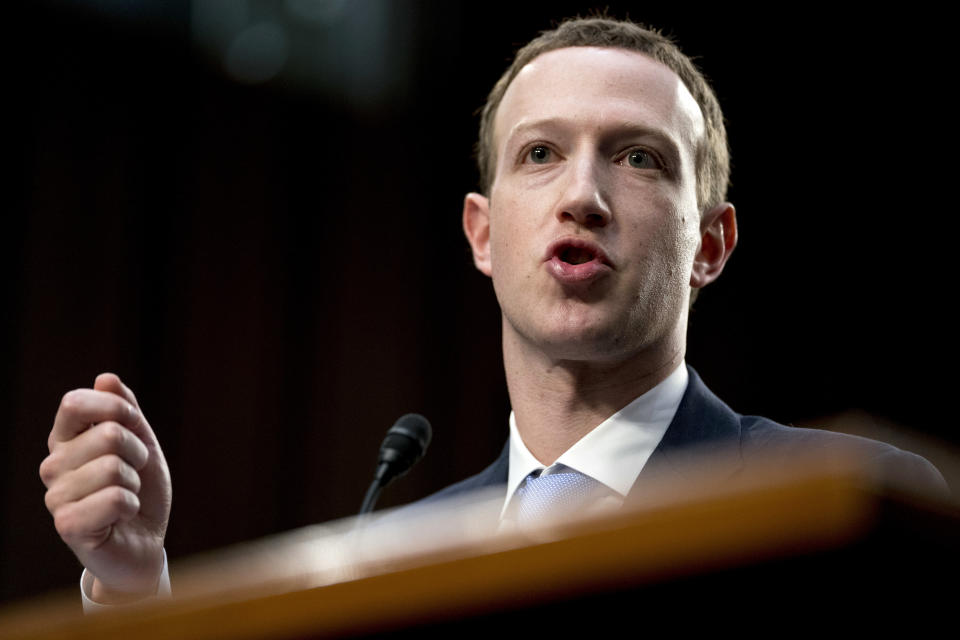Exclusive: Facebook execs calls for government ‘regulatory standard’ for content
In an exclusive interview, top executives at Facebook (FB) who oversee content called for government regulation of posts that appear on the site, saying the company has helped public officials better understand the platform and how to write rules for it.
But the executives did not provide specifics about the potential rules or how they may be enforced on a platform with 2.4 billion monthly active users worldwide.
“We think there does need to be a regulatory standard for how to deal with content,” says Guy Rosen, vice president of integrity, who oversees the development of products that identify and remove abusive content on the site.
“We sit down with governments and we share, this is how our systems work, this is how content is reported, how it's reviewed,” he adds.
Critics from across the political spectrum have assailed Facebook for a perceived failure to police bias, misinformation, and offensive content on its platform. In July, President Donald Trump derided the company for “terrible bias” against him and his backers. Meanwhile his political adversary, Democratic Massachusetts Senator Elizabeth Warren, attacked Facebook in March for removing presidential campaign ads that took aim at the tech giant.
The company has acknowledged that content moderation puts it in the difficult position of policing speech, spurring it to partner with outside fact-checking organizations after the 2016 election to address misinformation.
‘How do you measure what is effective?’
Facebook CEO Mark Zuckerberg initially called for government regulation of content in a March op-ed in the Washington Post, inviting, “third-party bodies to set standards governing the distribution of harmful content and to measure companies against those standards.”
Since the site’s users span the globe, potential regulation raises questions of how to make rules and enforce them, Rosen says.

“The world is trying to figure out what that looks like,” Rosen says. “How do you set benchmarks? How do you measure what is effective?”
“For us, it’s making sure that we're out there, and we're opening up, and we're sharing everything we've learned, and what we think sets up the right kind of measures and incentives, is exceptionally important,” he adds.
Last November, the company allowed French regulators to spend six months observing how the company removes hate speech and other abusive content.
To an extent, countries already regulate content on Facebook and Instagram: In the second half of 2018, the company restricted content on the platforms 35,972 times upon request from national governments, an increase of 135% from the prior six-month period, according to its transparency report.
Facebook complied with requests from scores of countries, including Russia and Saudi Arabia. Reasons given for the removal of content in Russia included the alleged violation of laws related to extremism and defamation. In Saudi Arabia, Facebook removed posts for alleged violation of laws related to sexualized content, the transparency report says.
Brendan Carr, commissioner of the Federal Communications Commission, in April rejected the government regulation of content put forward by Zuckerberg, calling it a threat to free speech. “This marriage of Big Tech and Big Brother would represent a sweeping new intrusion on our First Amendment rights,” he wrote.

In an exclusive interview at Facebook’s Menlo Park headquarters, Yahoo Finance Editor-in-Chief Andy Serwer spoke with the three executives who oversee content at Facebook — Monika Bickert, the head of global policy management; John DeVine, vice president of global operations; and Rosen.
Addressing whether Facebook should determine if posts contain false information, Bickert says, “We hear from people that they don't necessarily want a private company making that decision.”
If what has occurred with privacy regulation is any indication, content regulation may be slow in coming.
Consumer advocates have demanded lawmakers pass measures that protect online user data. A law passed last year in California, like the European Union’s General Data Protection Regulation, guaranteed users the right to know the data a company has obtained and to request it be deleted. In turn, roughly half of U.S. states took up data privacy bills this year.
The big tech companies say they support a strong federal data privacy measure, though lobbyists on their behalf have fought against over a dozen state bills.

Andy Serwer is editor-in-chief of Yahoo Finance. Follow him on Twitter: @serwer.
Read more:
Facebook's Zuckerberg and Sandberg are this involved with the company's content issues
Negative interest rates are coming and they are downright terrifying
Jamie Dimon: Donald Trump deserves ‘some’ credit for the strong economy
